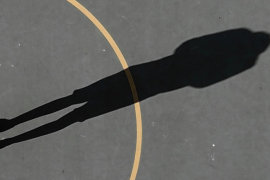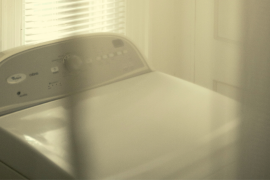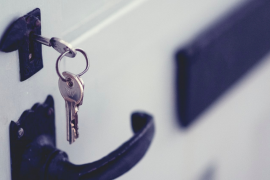WHEN MY HOUSEMATE CAME HOME, I WAS DOUBLED OVER on top of the monstrous 1940’s era heater that dominated the second floor of the flat we rented with two others. He was my least favorite of the bunch, a wraith-like art student at San Francisco State whose rabid love life was broadcast to us all through some strange alchemy of architecture and passion; in the mornings we’d have to face breakfasts with sketchy strangers nursing their hangovers with warm beers left out the night before. He noted my posture and asked if I was okay before moving on down the hall toward the bathroom.
I didn’t feel okay. My body had become unfamiliar in ways that scared me. My nipples burned so much I couldn’t wear a bra, and the smell of the popcorn constantly on offer in our kitchen kept sending me out onto our rooftop. There wasn’t much up there, a couple of ragged lawn chairs and a milk crate. The view was spectacular, though; the house perched on the top of a hill halfway between The Haight and Twin Peaks, and the city unfurled endlessly below its ragged Victorian splendor. It was to the roof that I lurched that afternoon to contemplate my options.
My live-in boyfriend Perry was my second lover; I had been twenty when I had sex for the first time. Not that my relatively sheltered adolescence absolved me of any responsibility. In fact, the enormity of physical intimacy was what had kept me virginal for so long. That and abject terror. I’d never been the most confident person in the world.
And so, the first thing I thought about was jumping. The second thing was this anti-drug movie called Go Ask Alice, last seen in my early teens. Why? I think maybe because all the stuff I’d been warned about doing my whole life was what I’d been doing within weeks of arriving in San Francisco. It was all one big bad thing: the sex, the weed, the nights out dancing in unsavory neighborhoods, the play I was in that ran from midnight to two a.m. four times a week. Pregnancy seemed like the inevitable fate I’d been running towards. I fell asleep thinking of baby names.
When I woke up Perry was in the chair next to me, beer in hand. He didn’t need to ask if I wanted one; in those days I never wasted calories on alcohol. I told him everything. He held me in his arms, said something that made me laugh, then cry a little.
The next morning, he went to work. I took the day off. I remember that I took the bus to a drugstore in a different neighborhood, which makes no sense to me now; our friends were based all over the city, and I knew no one who lived close by. It must have seemed like the right thing to do at the time, something gleaned from a film or TV. I bought a test and took it into the restaurant next door. I ordered coffee and drank it as quickly as I could. Then I headed to the restroom. The stick changed color.
Out on the street again, the sun seemed ridiculously bright. I found a phone booth and slammed my way into it. I called Annie, one of three close friends from college; we’d followed each other out here, each of us doing what we could to pave the way for the next East Coast arrival. Annie picked up immediately. She always seemed to be there when I needed her, and she was there for me then, her old-style Yankee calm pragmatism undercutting any drama I might have been prone to.
That evening, Perry and I had dinner with what Perry described as our “best couple;” he had this theory that once you’re part of a relationship you date other couples and eventually find a match. Nell and Ranney were ours. I had met Nell through work, and the four of us clicked almost immediately. We spent holidays together, went on movie marathons and to galleries, and stayed up late talking art and music. They were four or five years older than us, around twenty-six or seven, and I adored them both. We told them about the pregnancy and the decision we had made hours earlier to end it. I was only a few weeks along, there was no way we could care for a child, we weren’t ready to marry, etc.
I went home that night and sobbed.
A week later I interviewed at the city’s department of social services. Nell and Ranney had told Perry and me that on my meagre salary I could probably qualify for financial assistance with the medical side of things. And I did, but not until after filling out a lot of paperwork and succumbing to an intrusive array of questions, surrounded by throngs of people whose problems seemed exponentially worse than my own: the desks were all bunched tightly together and the sonic waves of human misery were inescapable. Shame washed over me and I thought of my parents, wondered if I’d ever tell them.
The procedure itself wasn’t too terrible. The doctor and nurses at Planned Parenthood were kind, and it was quick, so quick.
When Perry and I got back to the house, Nell and Ranney were waiting on the flaking front porch we shared with the downstairs tenants. As Perry fiddled with the door lock, a stab of pain and nausea hit me, and I stumbled on the threshold. Perry caught my elbow. Stop it, you’re fine, he said. Actresses, said Ranney, and Nell punched him playfully on the arm.
I went to lie down. From the bedroom I could hear the three of them, laughing and telling stories. It wasn’t the worst betrayal that would explode us, but it was the first, and the one I remember the most often, all these years later.
Like what you’re reading?
Get new stories or poetry sent to your inbox. Drop your email below to start >>>
OR grab a print issue
Stories, poems and essays in a beautifully designed magazine you can hold in your hands.
GO TO ISSUESNEW book release
I’ll Tell You a Love Story by Couri Johnson. Order the book of which Tim Jeffries said, “Surprising in their originality, filled with broken wisdom, and with a refreshing use of language and imagery, these are stories to savour and mull over one at a time but which add up to a satisfying whole.”
GET THE BOOK



